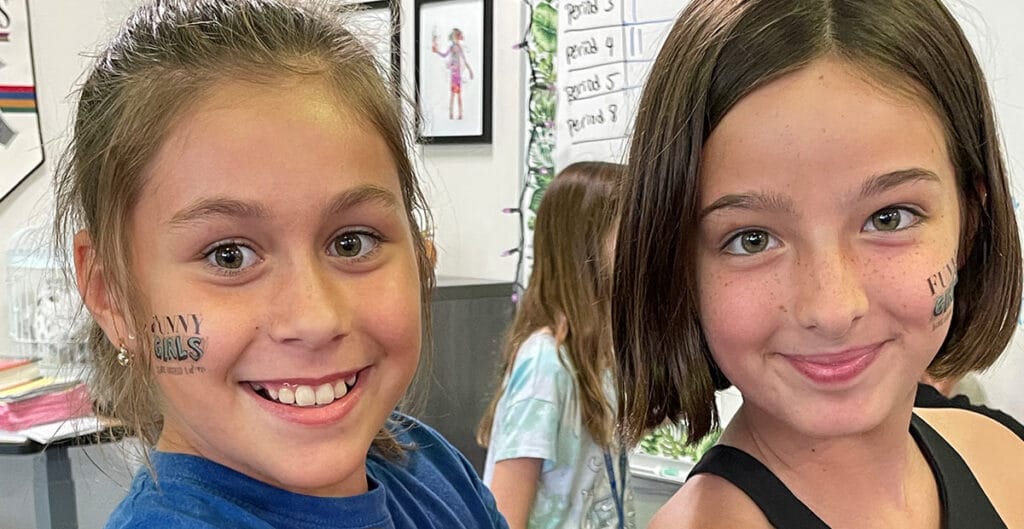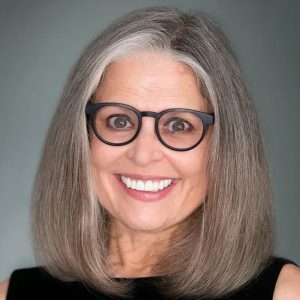
The statistic lands more like a punch than a punchline: Between the ages of 8 and 13, girls’ confidence levels drop 30 percent. Ouch. Tons of factors contribute to this bleak statistic, and it can be hard to parse them. But the consequences are clear: Girls start to doubt themselves. Some grow reluctant to take risks and feel uncomfortable speaking up. Down the line, that means fewer women in leadership positions and a world in which gender imbalances are still the painful norm. No joke.
That’s where “Funny Girls” – a program of the Harnisch Foundation – comes in. No, it’s not a comedy boot camp. Instead, it’s a leadership program for girls in third through eighth grade that uses improv (failure and risk-taking welcome – encouraged even!) to teach leadership skills. Yes, and: There happens to be a lot of laughter involved.
“So we’re not really teaching girls to be funny,” said Jenny Raymond, the Executive Director of the New York City-based Harnisch Foundation. “We’re teaching them to be present, and that methodology of improv is really key to that.”
While formulating a leadership program in 2013, Raymond and other organizers studied traditional women’s leadership training programs at Stanford, MIT and other places that understood the obstacles women face in the working world.
“Challenges like the accusation of being ‘bossy’ and just being a strong presence,” Raymond said. “Or being in a meeting and having your ideas glossed over until a peer – a male peer – mentions it again a couple of minutes later and everyone suddenly is like, ‘That’s a brilliant idea!’”
The “Funny Girl” masterminds struck upon improv classes where girls could be taught verbal ninja skills that would prepare them to tap into their strength and mental dexterity. Raymond said a few key leadership skills — “being a great listener and responding immediately” — happen to line up perfectly with the modality of improv.
Raymond and others began teaching improv methodology in 2013. Propelled by conversations with other girl leadership experts and Harvard research, the program truly took flight with a formal leadership-taught-through-improv curriculum aimed to help tween girls develop as leaders.
In partnership with the Magnet Theater and Pilobolus, the Funny Girls curriculum that launched in 2015 evolved as a series of improv exercises appropriate for the participants’ social and emotional development. As the program’s home page explains, the exercises correspond directly with specific leadership skills: self-awareness, learning agility, collaboration, empathy, and resiliency
“This curriculum,” Ruth Ann Harnisch, the founder and president of the Harnisch Foundation told Fobes in 2019, “has been developed to help girls learn to assess their own emotional temperature, to see what others are feeling so they can have some empathy for other people and to learn how to work in teams.”
In typical “Funny Girls” games, girls are taught the central improv concept of “Yes, and…” Essentially, it means building on whatever your scene partners just said as you work together to keep the bit going. The “Yes, and…” mindset sets the stage for collaboration on the fly, with equal voices taking turns improving upon the original idea.
“You don’t have to literally say, ‘Yes, and…’” Raymond said. “But if I say, ‘The gilding on your unicorn horn was amazing today.’ You wouldn’t say, ‘Shut up, I’m not a unicorn.’ You’d say, ‘Oh, I just had it done this morning. Thank you.’ So it’s that idea of ‘I hear you, I’m listening, and I’m responding.”
Raymond has a favorite example of this idea in action, and it came not long after the pilot program launched at three schools in the NYC metropolitan area in 2016.
There’s an exercise called “Three Friends” which puts the focus on empathy. For this one, a trio of girls gathered in the spotlight for a pretend press conference. The teacher/interviewer opened by asking the first girl what her name was.
“My name is Dave,” she said.
“My name is also Dave,” the second girl said.
“My name is Dave as well,” the third girl said.
So far, so good. The girls were riffing off each other. Comedy synergy crackled in the air. The interviewer followed up by asking how all the Daves knew each other.
“Oh,’’ the third girl replied, “we met at the Dave Conference.”
Raymond still laughs. “Without missing a beat!” she said. “She was 8 years old! It was so rad. It was like, ‘Of course you met at a Dave Conference.’”
To put the program’s success in comedy terms, “Funny Girls” continues to slay. The program operates in all five New York City boroughs, as well Upstate. “Funny Girls” also operates in Florida and, starting next year, in Texas and Las Vegas. It thrives as an after-school program and the Funny Girls team has made a particular effort to bring it to under-resourced communities.
Raymond has spoken at TEDWomen, National Coalition of Girls Schools, and the Girl Scouts National Convention, and has appeared on NBC Nightly News, in Glamour, and in a video produced by Amy Poehler’s Smart Girls.
Perhaps most fittingly, “Funny Girls” was featured on “The Kelly Clarkson Show,” which had the serendipitous bonus of sharing an episode with the legendary Carol Burnett, who was celebrating her 90th birthday.
“Super exciting with the original OG Funny Girl!” Raymond said with a laugh.
While the comedy might be ad-libbed, the program itself was painstakingly constructed. The creators chose the improv element as a strategic way to address the so-called confidence gap between girls and boys. And that “Funny Girls” targets the ages of 3rd to 8th grade is a key to the program, as that’s when the gap is particularly acute. A girl who might have been outgoing and free-spirited before might suddenly start hiding her inner awesomeness and thinking twice before raising her hand.
“Sometimes boys, they just say it,” Raymond said. “They don’t think about it. They just raise their hand or they just blurt out without thinking through the negative consequences that could happen if they say X, Y or Z.’ … I think that’s a skill that anybody can benefit from, just having that confidence.”
Looking back on the early days of the pilot program, Raymond said it was obvious almost from the start that “Funny Girls” had transformative power. Putting girls alone in environments where boys might otherwise dominate the action proved liberating, and proper nudges from the coaches created an atmosphere where confidence could flourish.
“(At first), I could see girls kind of on the fringe or not really wanting to participate,” she said. “And as the classes advanced, I could see hands shooting up. ‘Pick me! Pick me! I want to be part of this!’
“They wanted to know that feeling of affirmation from their peers. … The construct of improv is that every contribution is valid. And you have to support one another or the game stops.
“So they’re creating characters and plot on the spot. And if someone says no to it, the game ends. So the idea of affirmation was tremendous to behold, the psychological impact on girls. We could see by the second or third class that we were definitely landing.”
One of the next goals for The Harnisch Foundation involves talking to women’s leadership organizations about how to about how to apply some of the strategies that have made Funny Girls such a success to the campaign trail. After all, the tagline for the “Funny Girls” program is “Because leadership is no joke.”
“There are these women who are running for state legislature or are running for other offices, and they can see that there’s a quality that is required – a presence and personality,” Raymond said. “Again, it’s not teaching them to be funny. It’s just to be able to show your true colors in communicating and leadership.”
Raymond herself ultimately blossomed as a performer, a Juilliard-trained oboist with worldwide performances to her credit, including Carnegie Hall, The Kennedy Center and Lincoln Center.
These days, her stage thrills come from watching tween girls – and our future elected officials – tap into a side of themselves they might not know existed. And just to make sure the takeaway is obvious, instructors end sessions by helping girls connect the dots between what they did on stage and what they can do in the boardroom.
“Absolutely,” Raymond said. “When we started, we looked at about 20 different leadership skills that were being taught in executive training programs. And then we looked to see which of those overlapped with this idea of ‘Yes, and… ’
“Now, we can go in-depth with girls in our lessons. What is self-awareness? What is empathy? What is resiliency? What is learning agility? These are all leadership concepts, and then we break it down and use different games that connect to those.”
As for anyone who thinks there’s a more empowering program for girls?
You’ve got to be kidding.
Q&A with Ruth Ann Harnisch, founder and president of the Harnisch Foundation

How has the Geena Davis Institute inspired your work?
Don’t most little kids look for themselves in books, on television, in movies? I always did, and I was usually disappointed with the roles girls played in the media of my day: observers, helpers, victims, something to look at.
Decades later, Geena Davis found that gender stereotypes were still rampant, still declaring who was allowed to do what, to be what. She used her star power, brain power, and the power of her connections to create a movement that has changed the messages in modern media.
What is your “See it, Be it” impact?
The Harnisch Foundation has invested in gender equity since its founding in 1998, expanding opportunities for all genders and working for inclusion, acceptance, and civil rights.
Did/do you have a female role model?
I looked up to every woman who was doing something outside of my experience. Most women I knew were homemakers or “old maids,” as unmarried women of any age were called. When they were single, the women in my family had traditional female jobs: teacher, secretary, waitress, nurse. So any working woman with confidence and an interesting job was a role model. Including the cowgirls on television, unlikely career path for a girl from South Buffalo, NY.
Like the Institute, you focus on supplying proof to accelerate systemic change. We employ data. What evidence do you rely on?
One of the reasons I’m a longtime supporter of the Geena Davis Institute is research we can rely on. We count on you to know what’s worth studying , to study it well, and to share the results. From the beginning, we were inspired by Geena’s pioneering research, so much so that the Harnisch Foundation underwrote several research projects by the same academic experts who did Geena’s original studies.
What advice would you give a young woman looking to enter this business?
Real Talk: Do hundreds of interviews with people who do jobs you might want to do and ask for the truth about their lives. Read publications like The Ankler that are an education in the realities of the industry. Know what you’re getting into, how you’ll make money, and what you’ll do if the magic doesn’t happen.
